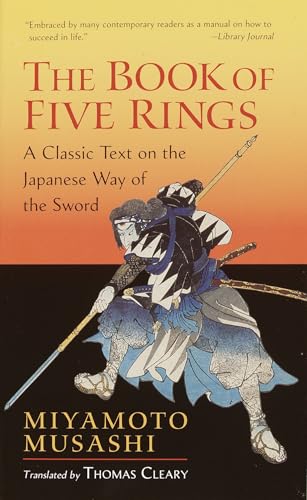The Book of Five Rings
A Classic Text on the Japanese Way of the Sword (Shambhala Library)
Miyamoto Musashi
BOOK REVIEW

In the realm of martial arts, few texts resonate with the ferocity and wisdom of The Book of Five Rings by Miyamoto Musashi. This remarkable treatise, penned by the legendary samurai during the tumultuous Edo period in Japan, does not merely discuss the art of swordsmanship; it transcends into an exploration of strategic philosophy and a guide to living with integrity and purpose. Musashi's writing emerges not just as an instruction manual for warriors but as a profound reflection on the human condition itself.
Musashi's journey is as compelling as the text he authored. He was an orphan, a vagabond, and ultimately became a two-sworded champion, kindling a legacy that would span centuries. His unconventional life was steeped in hardship and relentless pursuit of mastery, granting him insights that few could claim. Through his experiences, Musashi learned that the path of the sword is inseparable from the path of life. Every duel becomes an encounter of the self against chaos, teaching us that mastery lies not only in technique but in the stillness of the mind.
As you delve into The Book of Five Rings, you will uncover five distinct scrolls, each revealing a layer of Musashi's philosophy. The first, The Ground Book, details the importance of awareness and preparation-an echo of a time when survival hinged on the sharpness of one's senses. This scroll is an awakening, urging you to perceive beyond the superficial, to grasp the underlying currents of reality. Can you feel the weight of a sword in your hand as you read? Can you taste the air thick with tension before a duel? This is not mere theory; it's an invitation to embody a warrior's spirit.
In the second scroll, The Water Book, Musashi likens his strategy to the adaptability of water, a potent metaphor for life itself. You might find yourself reflecting on how rigidity hinders growth, and how an individual must flow and shape themselves according to circumstances. Here, the lessons penetrate deep-inviting you to confront your own immobility, to mold your destiny rather than be molded by it.
Moving through The Fire Book and its fiery explorations of intense combat, you may feel the adrenaline surge as Musashi details the warrior's mindset during conflict. This section blazes with urgency and raw emotion, urging you to understand that battles take place not just on the battlefield but within each of us. This is where Musashi's wisdom crystallizes: in every challenge lies the opportunity for transcendence. The reader, grappling with their own inner demons, is encouraged to harness that adrenaline, to emerge victorious not only in external struggles but in the personal wars we wage daily.
Musashi's reflections on the strategic layering of combat, articulated in The Wind Book, provide sharp insights into the philosophy of observation and imitation. Here, he starkly delineates the difference between true mastery and mere imitation-a cautionary lesson relevant in today's world of followers and facades. In a society inundated with noise, Musashi's call to find your authentic voice resonates more than ever.
Finally, the concluding scroll, The Book of the Void, takes a leap into the philosophical abyss. It's a profound meditation on emptiness, suggesting that true strength stems from understanding what lies beyond form and thought. This is a challenging concept yet one that encourages profound introspection-pushing you to contemplate your own existence in the abyss and the limitless potential that awaits when you let go of preconceived notions.
Readers have responded to The Book of Five Rings with mixed but passionate opinions. Some hail it as an essential guide to martial arts and self-discipline, while others perceive its philosophical depth as somewhat elusive, a riddle needing constant unraveling. Critics argue that Musashi's style can be cryptic, lost in an ancient context that feels foreign today. However, it is this very essence-the symbiosis of form and philosophy-that compels exploration.
In the end, The Book of Five Rings transcends mere instruction. It dares you to engage with the text on an emotional level, pushing you to confront your fears, your aspirations, and the very fabric of your being. Musashi's lessons on discipline, strategy, and mental fortitude resonate in every swing of the sword, reminding us that as we navigate our own battles, we are always the architects of our destiny. The echoes of his wisdom reverberate through time, challenging you to see the sword not merely as a weapon but as a path to uncovering the warrior within. 🌪
To turn your gaze towards Musashi's work is to enter a landscape rich with possibility-are you prepared to wield the blade of understanding?
📖 The Book of Five Rings: A Classic Text on the Japanese Way of the Sword (Shambhala Library)
✍ by Miyamoto Musashi
🧾 192 pages
2005
#book #five #rings #classic #text #japanese #sword #shambhala #library #miyamoto #musashi #MiyamotoMusashi